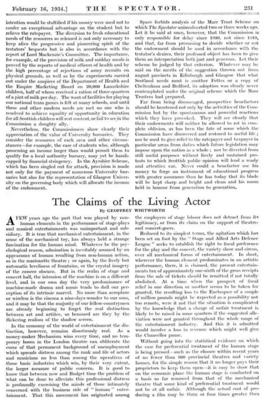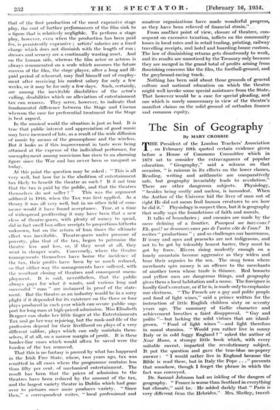The Claims of the Living Actor
By GEOFFREY WHITWORTII
A FEW years ago the part that was played by non- human elements in the performance of stage-plays and musical entertainments was unimportant and sub- sidiary. It is true that mechanical entertainment, in the sense of the mechanical toy, has always held a strange fascination for the human mind. Whatever be the psy- chological reason, admiration is inevitably aroused by an appearance of human resulting from non-human action, as in the marionette theatre ; or again, by the lively but automatic loveliness of fountains, or the crystal imagery of the camera obscura. But in the realm of stage and concert hall, the intrusion of the machine is on a different level, and in our own day the very predominance of machine-made drama and music tends to dull our per- ception of its intrinsic marvel. No more than aeroplane or wireless is the cinema a nine-days-wonder to our sons, and it may be that the majority of our fellow-countrymen are already beginning to -forget the, real distinction between . art and artifice, so bemused are they by the flickering: realism of the shadow screen.
• In the economy of the world of entertainment the dis- tinction, however, remains disastrously real. As a money-maker Mechanism wins every time, and no tem- porary boom in the London theatre can obliterate the curse of that permanent background of unemployment which spreads distress among the rank and file of actors and musicians no less than among the operatives of those basic .industries which win, by their very extent, the larger. __measure of public concern. It is good to know that between now and Budget time the problem of what., can, be done to alleviate this professional distress is profoundly exercising the minds of those intimately concerned, with the business side of " human " enter- tainment. That this movement has originated among the employers of stage labour does not detract from its legitimacy, or from its claim on the support of theatre. and concert-goers.
Reduced to its simplest terms, the agitation which has been set on foot by the "Stage and Allied Arts Defence League" seeks to establish the right to fiscal preference for the play and the concert, the variety show and circus, over all mechanical forms of entertainment. In short, wherever the human element predominates in an artistic performance, there, it is claimed, the present entertain- ments tax of approximately one-sixth of the gross receipts from the sale of tickets should be remitted if not totally abolished. At a time when the prospect of fiscal relief in one direction or another seems to be taken for granted, the resulting loss to the Exchequer of a couple of million pounds might be expected as a possibility not too remote, were it not that the situation is complicated by the knowledge that a charge of unfair treatment is likely to be raised in some quarters if the suggested alle- viation were not granted throughout the whole range of the entertainment industry. And this it is admitted would involve a loss in revenue which might well give the Chancellor pause.
Without going into the statistical evidence on which the case for preferential treatment of the human stage is being pressed—such as the closure within recent years of no fewer than 300 provincial theatres and variety houses, for the simple reason that it no longer pays their proprietors to keep them open—it is easy to show that on the economic plane the human stage is conducted on a basis so far removed from that of the mechanical theatre that some kind of preferential treatment would not be at all unfair. Although the actual cost of pro- ducing a- film may be three or four times greater than that of the first production of the most expensive stage play, the cost of further performances of the. film sink to a figure that is relatively negligible. To perform a stage play, however, even when the production has been paid, for, is persistently expensive artists' salaries are a fixed charge which does not diminish with the length of run ; dresses and scenery are a continually wasting asset. And' on the human side, whereas the -film actor or actress is always remunerated on a scale which assumes the future. success of the film, the stage- player, after a long and ill- paid period of rehearsal, may find himself out of employ- ment after receiving his modest salary for only a few weeks, or it may be for only a few days. Such, certainly, are among the • inevitable disabilities of the actor's calling, disabilities which no alleviation of entertainment tax can remove. They serve, however, to indicate that fundamental difference between the Stage and Cinema whereon the case for preferential treatment for the Stage is best argued.
In the musical world the situation is just as bad. It is true that public interest and appreciation of good music may have increased of late, as a result of the wide diffusion of music by means of the gramophone and the wireless. But it looks as if this improvement in taste were being attained at the expense of the individual performer, for unemployment among musicians has risen to an alarming figure since the War and has never been so rampant as today.
At this point the question may be asked : " This is all very well, but how far is the abolition of entertainment tax likely to benefit the theatre as such ? It it not true that the tax is paid by the public, and that the theatres themselves do not suffer ? " This was the argument adduced in 1916, when the Tax was first applied. As a theory it was all very well, but in no other field of com- merce would it have found acceptance. True, at a time of Widespread profiteering it may have been that a new class of theatre-goers, with plenty of money to spend, did in fact swell box-office receipts to proportions hitherto unknown, but on the return of lean times the ultimate effect was inevitable. Theatre-goers under pressure of poverty, plus that of the tax, began to patronize the theatre less and less, or, if they went at all, they went in cheaper scats. Conversely, where the theatre managements themselves have borne the incidence of the tax, their profits have been by so much reduced, No that either way the managements have suffered, with the resultant closing of theatres and consequent unem- ployment. It is said, nevertheless, that the public always pays for what it wants, and various long and successful " runs " are instanced in proof of the state- ment. But the theatre as an industry would be in a sorry plight if it depended for its existence on the three or four plays produced in each year which can secure public sup- port for long runs at high-priced admission. Miss Elisabeth Bergner can shake her little finger at the Entertainments Tax and go her way rejoicing, but the rank-and-file of the profession depend for their livelihood on plays of a very different calibre, plays which can only maintain them- selves, if at all, on a narrow margin of profit. It is these border-line cases which would often be saved were the burden of the tax removed. That this is no fantasy is proved by what has happened in the Irish Free State, where, two Years ago, tax was remitted in all cases where the programme contains less than fifty per cent. of mechanical entertainment. The result has been that the prices of admission to the theatres have been reduced by the amount of the tax, and the largest variety theatre in Dublin which had gone over to pictures. once More produces • variety. "Since 'then,' a correspondent writes, • •" local professional -and amateur organizations have made wonderful progress, as they .have, been relieved of financial strain.", From another point of view, closure of theatres, con- sequent on excessive taxation, inflicts on the community losses in local rates and in retail trading, printing, railway travelling receipts, and hotel and boarding-house custom: The law of diminishing returns gets disastrously_ to work, and its results are unnoticed by the Treasury only because they are merged in the grand total of profits arising from flourishing concerns like the film, the football-ground, and the greyhound-racing track. . . .
Nothing .has been said about those grounds of general. culture and national education on which the theatre might well invoke some special assistance from the State., That however would be a case for special pleading, and one which is surely unnecessary in view of the theatre's manifest claims on the solid ground of orthodox finance and common equity.









































 Previous page
Previous page